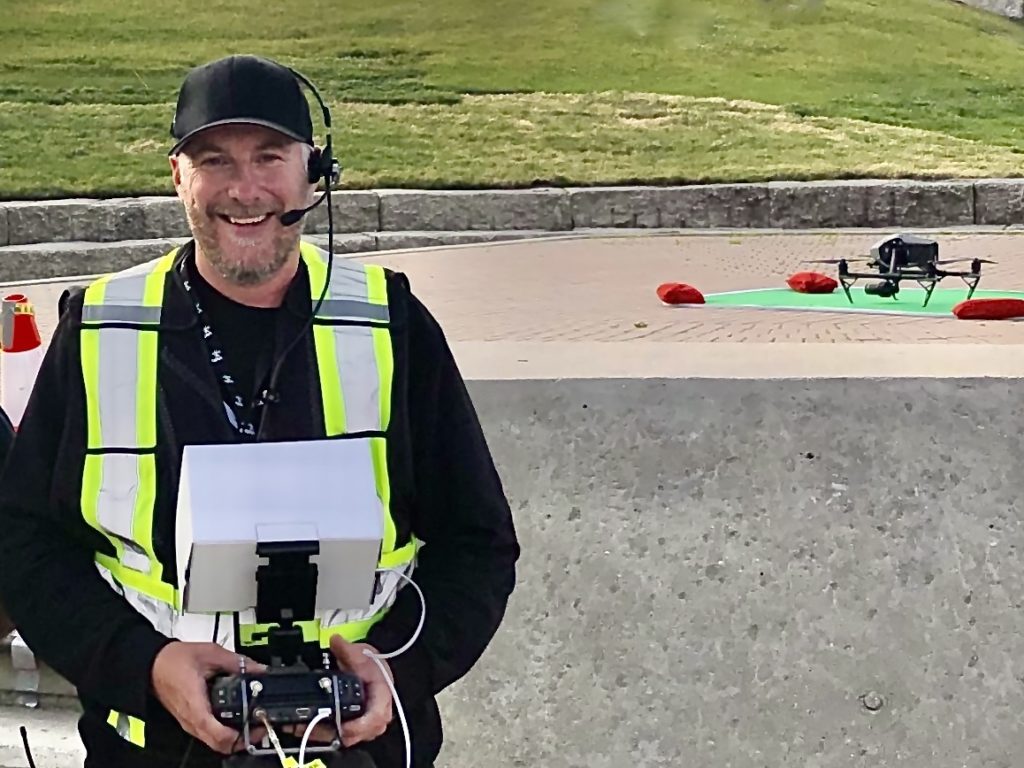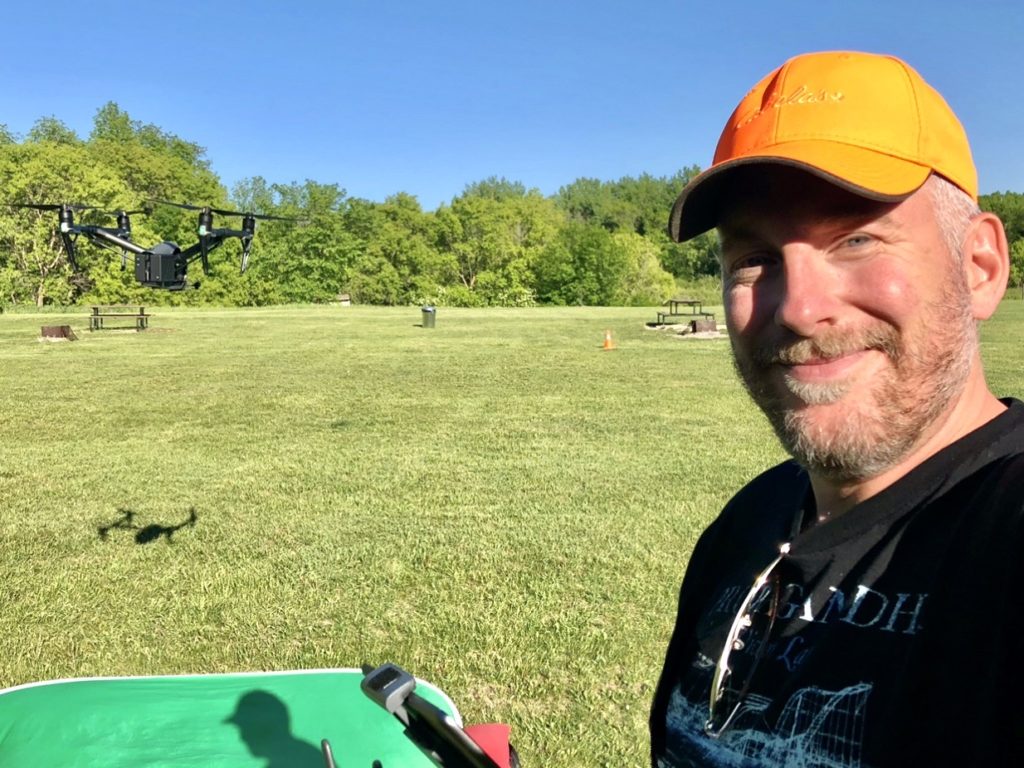
Ryan Cheale has over 20 years of experience in broadcast television and film. He has spent a majority of his career as a DOP/videographer and editor. Ryan was the director of photography for the 2010 CBC/Radio-Canada documentary, on the first Truth and Reconciliation Commission hearings, in Winnipeg, winning an honourable mention in 2011 at the Organisme de Communication et Société awards.
In 2020, a CBC/Frank Digital documentary he edited called Fostering Hope, won an award of Excellence from Impact Docs, and a Platinum Remi award at the Worldfest Film Festival. Now, Ryan is launching into a new venture, and the sky is the limit, as long as it’s 400 feet or less!
When and how did you get started in the film and media production industry?
My grandfather and father were professional photographers, so it could be in the blood. My dad gave me one of his 1964 Pentax Spotmatic 35mm film cameras when I was very young. He taught me about composition, how to use it, and I was taking pictures with it into my 20s, I still have it! In 2001, I went to college for television production and broadcasting, focusing on cameras and edit systems, linear and non-linear.
After college, I spent a year in film, and then went into television news. I shot, edited, and produced news, arts, sports, documentaries and live productions for 15 years. As broadcasters had to deal with ever expanding formats, all of that dried up and it became only daily news. I had some great experiences, travelled all over and learned a lot from some very talented individuals, but the writing was on the wall and daily news wasn’t where my passion was.
What area of the film industry do you work in now and why? What do you like most about it?
It’s very much a multimedia world now more than ever, so a transition into private production had a lot of opportunities. I’ve primarily been a camera op/DOP and editor for different production houses and my own business. Working on materiel in english and french for television broadcast and streaming services, with a bit of film work here and there.

I’ve been focusing more on drone work the last several years, purchasing my first serious drone in 2015. A company I worked for sent me through pilot ground school at M3 Aerial in early 2019 and after several exams and a flight review, I got my advanced pilot license from Transport Canada. I started flying for film, television, commercials etc., but the pandemic pushed me into being more independent.
I started Drone Manitoba almost a year ago, and it’s starting to take off! (Pun intended). Primarily for television and streaming, but I’ve had a variety of projects and over 70 shoots since starting the company in May of 2021. I recently did a drone flight, inside the Manitoba Legislative building. It was an amazing experience and privilege to be the first to capture that incredible history and architecture with a drone!
I’ve been contributing to TSN Jets all season, capturing our downtown and the arena that you see during the Jets games. I’m a huge fan of the team, so it’s nice to contribute to the production.
Right now I’m working with National Geographic, capturing some beautiful Manitoba scenery. Kind of a dream come true having the kind of exposure that National Geographic brings and their level of professionalism.
I very much enjoy the new possibilities and views that the airspace has to offer. There’s so much of a wow factor having almost unlimited angles and ways to capture footage with drones, and the technology is just amazing. DM uses a wide array of DJI drones.
What’s a substantial change you’ve witnessed since starting in the industry?
The biggest changes in the last 20 years from my point of view, is going from film, then tape, to digital and all the technology that surrounds that! We use to have gear last 10 plus years, now it’s every other year you need to upgrade or you get left behind.
What advice would you most like to give to your past self?
Don’t spread yourself too thin by trying to specialize in everything. Be well versed in a few things…less of a Jack of all trades, more a master of some.
What advice would you give to somebody just starting out in the industry?
1. Find something you like to do and are passionate about, and if you ever lose that passion,
MOVE ON to the next challenge! Don’t hang on to it just because it pays the bills, has benefits, or a pension…you will be miserable, and your work will suffer. If you stay passionate, it will show in your work, you’ll love what you do, and you’ll never work a day in your life!
2. Ask questions!! Gather as much knowledge as you can as you make your way through.
Knowledge is king/queen in this business.
If you could work on a project with anyone in the film industry, who would it be and why?
I already work with many great talented people in the Canadian industry and beyond! I’m very happy to work with the people I do in Winnipeg especially, lots of talent here. It’s a giant family, where it’s like a reunion anytime you show up to a shoot or have a zoom meeting. Everyone is so happy to see each other. To answer the question though, George Lucas, only because I’m a massive Star Wars nut, and Mr. Kubrick is no longer with us.
What films, TV, or books inspire you or get you excited about your work?
What inspires me and gets me excited about my work can’t be read in a book, it’s the work itself! One day you may be in a studio editing, the next shooting a concert, the next you may be on a wilderness doc, canoeing and trekking through the deepest of backwoods. It could be capturing footage hanging out of a helicopter, or flying a drone and capturing footage from angles never seen before. Long answer short, the adventure of it all!!
Why is learning and training important?
One should never stop learning, especially in this constantly evolving and ever-changing industry. I took FTM’s Set Etiquette course 20 years ago when I first got on to film sets. To this day, I always wear my set blacks, to not cast bright colours that reflect in a shot or to distract from the show, (unless flying, then it’s bright orange haha). FTM has so many opportunities to learn from the same talented people that work on those crews and sets.
I know I’ve learned a lot from them and have seen what they have to offer.
What do you like most about working in the Manitoba film industry? Is there anything in your mind that sets it apart?
The people, 100%, the people are the best part. Everyone is so friendly, professional, and willing to help each other. A personal analogy I can relate the experience to is; I was at a concert, in a mosh pit in my 20’s, and was knocked over hard, before I could even hit the ground, 4 people already had my arms and were pulling me back up! That’s the best visual I could give, lots of support and friendliness in our industry.
Do you have any other experiences or hidden talents you’d like to share?
I love being a colourist as well. DaVinci Resolve is the best thing that’s ever happened to footage. When you work with multiple formats, codecs and cameras, it is a constant challenge to get it right, and it’s so satisfying when you do.
Where do you see yourself ten years from now?
On a beach, flying a drone for some adventure show…and sneak the fam out there with me 😉
Family is number one! Work to live, not live to work…but it’s not really work when it’s fun, right??
FTM is a non-for-profit charity and member of the Province of Manitoba’s sector council program (through the Department of Economic Development and Jobs). FTM conducts workforce development and training to build a highly skilled and adaptable film industry to support the activities of Manitoba production companies. FTM collaborates with members of the film and television industry to identify the training needs within the community.
